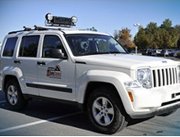Article from: www.thenewspaper.com/news/39/3961.asp
11/29/2012
Legislative Auditor Faults Maryland Speed Camera Program
Maryland legislative audit report raises doubts about reliability of speed camera evidence.
 Critics of the speed camera program in Maryland received a significant boost this week as an official investigation has documented their long-standing concerns. The General Assembly's Office of Legislative Audits was asked to look at the books at the State Highway Administration (SHA), and problems with the state's highway "work zone" speed cameras immediately stood out.
Critics of the speed camera program in Maryland received a significant boost this week as an official investigation has documented their long-standing concerns. The General Assembly's Office of Legislative Audits was asked to look at the books at the State Highway Administration (SHA), and problems with the state's highway "work zone" speed cameras immediately stood out.
"SHA did not ensure that contractor performance benchmarks were established for the pilot program, and we noted certain issues regarding the reliability and readability of the photographed violations," acting Legislative Auditor Thomas J. Barnickel III wrote.
StopBigBrotherMD.org has been documenting the program's legal and accuracy issues since the state signed a contract with Affiliated Computer Services (ACS, now a part of Xerox) on June 22, 2010. ACS runs lidar-based mobile speed camera vans on freeways where the speed limit has been lowered in designated work zones, regardless of whether workers are actually present.
The state set up its request for proposals so that ACS, a highly connected firm, would land the lucrative deal. ACS had spent $211,453 to lobbby lawmakers in 2009 and was able to act without much oversight once it landed the lucrative deal.
"The current contract for operating the automated speed monitoring system was executed even though the successful contractor's proposal, which was the only proposal received, did not comply with certain request for proposal requirements," Barnickel wrote. "SHA also lacked adequate assurance that the contractor was meeting a key performance requirement."
SHA did not bother measuring ACS performance against objective measures, even though such oversight was a contract requirement. The auditor noted that 56 percent of the camera photographs that were taken turned out to have unreadable license plates or unreliable speed readings. The auditor was concerned this represented the loss of $3 million in revenue. Even though SHA specified the speed camera system had to be certified as accurate by the International Association of Chiefs of Police, the ACS system had not been certified by April 2012. The department did hire a private consultant to establish the reliability of the camera speed readings, but the auditor raised serious doubts about the procedures used.
"The consulting firm deviated from SHA's testing instructions and therefore, the basis for the conclusion that the equipment met performance requirements is questionable," the audit report concluded.
SHA asked for the laser device to be tested with 40 speed runs against two radar speed gun readings. The contractor only performed 18 tests and failed to report the results from 10 of them. Similarly, once the ACS cameras were issuing tickets, the calibration of the devices was not verified by an independent testing lab for nine straight months. State law requires these checks on an annual basis, but SHA argued the law does not specify when the first test must take place. The auditor disagreed.
"In our opinion, to help ensure the cameras were functioning properly when implemented, the independent certification should have been conducted at the beginning of the contract, and then annually thereafter as required by state law and the contract," the audit report stated.
A copy of the audit is available in a 180k PDF file at the source link below.
Source: Audit Report - State Highway Administration (Maryland Office of Legislative Audits, 11/26/2012)
Permanent Link for this item
Return to Front Page
 Critics of the speed camera program in Maryland received a significant boost this week as an official investigation has documented their long-standing concerns. The General Assembly's Office of Legislative Audits was asked to look at the books at the State Highway Administration (SHA), and problems with the state's highway "work zone" speed cameras immediately stood out.
Critics of the speed camera program in Maryland received a significant boost this week as an official investigation has documented their long-standing concerns. The General Assembly's Office of Legislative Audits was asked to look at the books at the State Highway Administration (SHA), and problems with the state's highway "work zone" speed cameras immediately stood out.